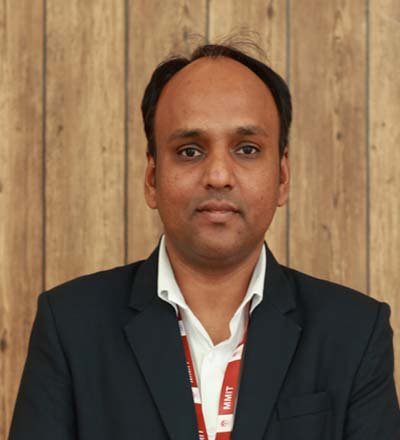About
Home » Robotics and AI

Prof. Dr. Amol S. Bhanage
Head of the Department
Robotics and Artificial Intelligence is a dynamic, interdisciplinary field that blends Computer Science, Mechanical Engineering, and Electronics Engineering. It encompasses the design, development, and deployment of robots, along with their real-world applications. Advances in robotics are driving a technological revolution, creating diverse and exciting career opportunities for future innovators.
The Robotics and AI program distinguishes itself through a cutting-edge, interdisciplinary curriculum that integrates cognitive technologies, AI/ML, computer vision, and robotics-equipping students with the skills to solve real-world challenges. What sets us apart is our hands-on, innovation-driven approach, coupled with a strong emphasis on ethical AI development. With industry collaborations and research opportunities, students gain practical experience and stay ahead in the rapidly evolving tech landscape. This holistic, future-focused program ensures graduates are not just skilled but also responsible pioneers in intelligent systems.
Salient Features:
- The curriculum is designed in line with the latest industry trends and as per NEP (National Education policy) to ensure a future-ready education.
- State-of-the-art workshops, labs, and fabrication facilities spread across the campus.
- Implementation of industry-driven programs, hands-on experiential learning, skill development modules, and real-world engineering applications.
- Regular industrial visits, expert guest lectures, technical workshops, hackathons, and project expos to enhance practical knowledge.
- Advanced laboratories for design, automation, manufacturing, thermal engineering, and material sciences.
- Highly qualified faculty with strong academic, research, and industrial credentials.
- A highly interactive learning environment with opportunities to engage with industry professionals and researchers.
- Excellent internship and placement records with top recruiters from core and interdisciplinary sectors.
- MoUs and collaborations with leading Industries, research organizations, and academic institutions for research, innovation, and professional growth.
VISION
“To be a center of excellence in Robotics and Artificial Intelligence education and research, fostering innovation, ethical leadership, and sustainable solutions for societal and industrial advancement”
MISSION
Mission 1: Technical and Research Excellence
To provide high-quality education that equips students with strong foundational knowledge and advanced technical skills in Robotics, Artificial Intelligence, and core Mechanical Engineering, enabling them to solve complex real-world problems.
Mission 2: Innovation and Ethical Responsibility
To cultivate a learning environment that promotes innovation, ethical practices, leadership, and social responsibility, preparing graduates to contribute positively to industry and society.
Mission 3: Lifelong Learning and Entrepreneurship
To encourage continuous learning, entrepreneurial mindset, and adaptability, empowering students to excel in dynamic technological landscapes and pursue impactful professional careers.
Program Educational Objectives: (PEO`s)
-
Have successful professional career in industry, government, academia and military as innovative engineers. -
Successfully solve engineering problems associated with the lifecycle of Robotics and Artificial Intelligence Systems by communicating effectively either leading a team or as a team member.
-
Continue to learn and advance their careers through activities such as participation in professional organizations, attainment of professional certification for lifelong learning and seeking higher education. -
Be active members ready to serve the society locally and internationally and will take up entrepreneurship for the growth of economy and to generate employment.
Program Outcomes (PO's)
| PO No. | Title | Program Outcome Description |
|---|---|---|
| PO1 | Engineering Knowledge | Apply knowledge of mathematics, natural science, computing, engineering fundamentals and an engineering specialization as specified in WK1 to WK4 respectively to develop the solution of complex engineering problems. |
| PO2 | Problem Analysis | Identify, formulate, review research literature and analyze complex engineering problems reaching substantiated conclusions with consideration for sustainable development. (WK1 to WK4) |
| PO3 | Design / Development of Solutions | Design creative solutions for complex engineering problems and design/develop systems/components/processes to meet identified needs with consideration for public health and safety, whole-life cost, net zero carbon, culture, society and environment. (WK5) |
| PO4 | Conduct Investigations of Complex Problems | Conduct investigations of complex engineering problems using research- based knowledge including design of experiments, modelling, analysis & interpretation of data to provide valid conclusions. (WK8) |
| PO5 | Engineering Tool Usage | Create, select and apply appropriate techniques, resources and modern engineering & IT tools, including prediction and modelling, recognizing their limitations to solve complex engineering problems. (WK2 and WK6) |
| PO6 | The Engineer and The World | Analyze and evaluate societal and environmental aspects while solving complex engineering problems for its impact on sustainability with reference to economy, health, safety, legal framework, culture and environment. (WK1, WK5, and WK7) |
| PO7 | Ethics | Apply ethical principles and commit to professional ethics, human values, diversity and inclusion; adhere to national & international laws. (WK9) |
| PO8 | Individual and Collaborative Team Work | Function effectively as an individual, and as a member or leader in diverse/multi-disciplinary teams. |
| PO9 | Communication | Communicate effectively and inclusively within the engineering community and society at large, such as being able to comprehend and write effective reports and design documentation, make effective presentations considering cultural, language, and learning differences. |
| PO10 | Project Management and Finance | Apply knowledge and understanding of engineering management principles and economic decision-making and apply these to one’s own work, as a member and leader in a team, and to manage projects in multidisciplinary environments. |
| PO11 | Life-Long Learning | Recognize the need for, and have the preparation and ability for: (i) independent and life-long learning, (ii) adaptability to new and emerging technologies, and (iii) critical thinking in the broadest context of technological change. (WK8) |
Program Specific Outcomes (PSOs)
| PSO No. | Title/Focus Area | Description |
|---|---|---|
| PSO 1 | Foundation and Application of Robotics | Graduates will be able to apply kinematics, dynamics, control systems, and mechanical design to model, analyze, and develop robotic systems for industrial and real-world applications |
| PSO 2 | Integration of Robotics with Artificial Intelligence | Graduates will demonstrate the ability to integrate AI techniques (such as machine learning, computer vision, and intelligent control) with mechanical systems to develop autonomous and adaptive robotic solutions. |
| PSO 3 | Design and Development of Intelligent Systems | Graduates will possess the skills to design, simulate, and implement intelligent robotic systems by combining mechanical components with embedded systems, sensors, actuators, and AI algorithms to address real-world problems in manufacturing, healthcare, and automation. |
Knowledge and Attitude Profile (WK)
| WK No. | Title/Focus Area | Description |
|---|---|---|
| WK 1 | Natural Sciences and Social Sciences | A systematic, theory-based understanding of the natural sciences applicable to the discipline and awareness of relevant social sciences. |
| WK 2 | Mathematics and Data Analysis | Conceptually-based mathematics, numerical analysis, data analysis, statistics and formal aspects of computer and information science to support detailed analysis and modelling applicable to the discipline. |
| WK 3 | Engineering Fundamentals | A systematic, theory-based formulation of engineering fundamentals required in the engineering discipline. |
| WK 4 | Engineering Specialist Knowledge | Engineering specialist knowledge that provides theoretical frameworks and bodies of knowledge for the accepted practice areas in the engineering discipline; much is at the forefront of the discipline. |
| WK 5 | Engineering Design and Environmental Considerations | Knowledge, including efficient resource use, environmental impacts, whole- life cost, re-use of resources, net zero carbon, and similar concepts, that supports engineering design and operations in a practice area. |
| WK 6 | Engineering Practice (Technology) | Knowledge of engineering practice (technology) in the practice areas in the engineering discipline. |
| WK 7 | Role of Engineering in Society | Knowledge of the role of engineering in society and identified issues in engineering practice in the discipline, such as the professional responsibility of an engineer to public safety and sustainable development. |
| WK8 | Research and Critical Thinking | Engagement with selected knowledge in the current research literature of the discipline, awareness of the power of critical thinking and creative approaches to evaluate emerging issues. |
| WK 9 | Ethics and Inclusive Behavior | Ethics, inclusive behavior and conduct. Knowledge of professional ethics, responsibilities, and norms of engineering practice. Awareness of the need for diversity by reason of ethnicity, gender, age, physical ability, etc., with mutual respect. |
Robotics and AI Engineering
TOPPERS LIST

Mergal Prasad Bandu
First Rank SGPA 9.02

Ray Dipa Virendra
Second Rank SGPA 9.00

Patil Tanishka Prakash
Second Rank SGPA 9.00

Vishwasrao Pranjal Avinash
Third Rank SGPA 8.93

Kachale Ayush Arjun
Fourth Rank SGPA 8.82
